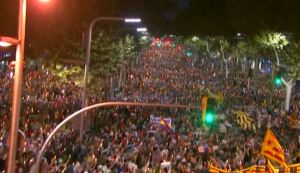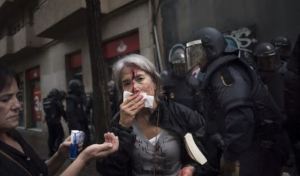nsnbc : Hundreds of thousands have taken to the streets in Catalonia to protest against the detention of two prominent independence leaders. Monday night Spain’s National Court denied bail for “separatists” Jordi Sánchez, the president of the Catalan National Assembly (ANC), and Jordi Cuixart, the president of Òmnium Cultural. Both men are being investigated for alleged sedition in the run-up to the regional independence referendum two weeks ago.
 One of the allegedly criminal acts Sánchez and Cuixart are accused of is using mass demonstrations and to try to stop Spanish national police officers following a judge’s orders to halt the independence referendum that had already been suspended by the country’s constitutional court. National police officers busted into a number of polling stations, disgracing themselves by brutalizing voters including elderly or by using batons, beating over their heads those who were leaving polling stations.
One of the allegedly criminal acts Sánchez and Cuixart are accused of is using mass demonstrations and to try to stop Spanish national police officers following a judge’s orders to halt the independence referendum that had already been suspended by the country’s constitutional court. National police officers busted into a number of polling stations, disgracing themselves by brutalizing voters including elderly or by using batons, beating over their heads those who were leaving polling stations.
The Catalan President, Carles Puigdemont, denounced the court’s decision and described both men as “political prisoners”. “Spain jails Catalonia’s civil society leaders for organising peaceful demonstrations,” he tweeted on Monday night. “Sadly, we have political prisoners again.” Tuesday Barcelona mayor Ada Colau, tweeted: “Catalonia has woken up saddened and worried today. The imprisonment of [Sánchez and Cuixart] is a threat to everyone’s rights and freedoms.”
Thousands of people crowded into the Plaça Sant Jaume in the Catalan capital at midday on Tuesday to demonstrate against the ruling. Similar demonstrations were held in Tarragona, Lleida and Girona. About 500 students abandoned their classrooms in one of Barcelona’s main universities to join the demonstrations. On Monday night police said around 200,000 people gathered in Barcelona for a candlelit vigil, filling a vast stretch of Diagonal, the six-lane thoroughfare that cuts across the city.
Despite Puigdemont’s assertion that the detentions were politically motivated, the Spanish government’s senior representative in Barcelona said the judge’s decision had been made independently. “There is a separation of powers here,” Enric Millo told Catalunya Radio. The view was echoed by Spain’s justice minister, Rafael Catalá. “We can talk of politicians in prison but not political prisoners,” he told reporters. “These are not political prisoners because yesterday’s prison ruling was due to an [alleged] crime.”
On 20 and 21 September, police raided Catalan regional government offices and arrested 14 senior officials in an attempt to head off the vote. The raids brought thousands of Catalans out to protest.
In her ruling, Judge Carmen Lamela claimed the events of 20 and 21 September “did not constitute an isolated, casual or peacefully convened civic protest against police actions carried out on a judge’s orders. On the contrary, the activities already described were part of a complex strategy in which Jordi Cuixart and Jordi Sánchez have been involved for a long time as part of a roadmap designed to bring about Catalan independence.”
Lamela said that both Sánchez and Cuixart had directed the crowds, with the former telling them: “No one should go home. It’s going to be a long and intense night.” At one point, the two leaders stood on the roof of a Guardia Civil car and called for “permanent mobilization” to make sure the referendum went ahead. One of the reasons the judge denied them bail was “because of the high likelihood that the two men under investigation could go about hiding, altering or destroying sources of evidence”.
The court decided that Josep Lluís Trapero, the head of the Catalan police force who is also being investigated for sedition could remain free. However, the police chief was slammed with a travel ban and had to surrender his passport. He also has to stay in regular contact with the court. Under Spanish law, sedition is classified as using “force or illegal means to prevent the application of the law, the legitimate exercise of the functions of public authorities or the observance of administrative or judicial decisions”. It carries a maximum sentence of 15 years’ imprisonment.
F/AK – nsnbc 18.10.2017
Source Article from https://nsnbc.me/2017/10/18/detention-of-secessionist-leaders-sparks-mass-protests-in-catalonia/
 RSS Feed
RSS Feed















 October 18th, 2017
October 18th, 2017  Awake Goy
Awake Goy 











 Posted in
Posted in  Tags:
Tags: 













